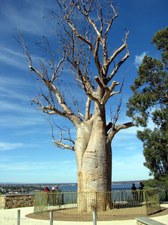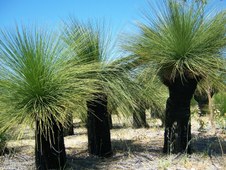 | 1.
Boab The Boab Tree (Adansonia gregorii) is easily recognised by the swollen base of its trunk which gives the tree a bottle-like appearance. Endemic to Australia, this Boab occurs in the Kimberley region of Western Australia and east into the Northern Terriitory. It is the only boabab to occur in Australia. The Australian Aboriginal Legend of the Boab Tree:-- "When The Tree God created the Boab Tree it was to be the most beautiful of all trees in the universe, with the most beautiful flowers and bearing the juiciest fruit. But as the tree grew to maturity its flowers were mediocre and its fruit had a bad odour and tasted vile. The Tree God became so angry that he yanked the Boab out of the ground and slammed it back in the earth upside down and that is why today, when you see a Boab tree, it looks as if its roots are growing up in the air." |
| 8864 Visits
18 Images
Gallery Album | |
|
 | 2.
Grasstrees The Grasstree (Xanthorrhoea preissii) is very much part of the West Australian landscape and uniquely Australian. They fascinated the first European settlers, since they were unlike any other known plant. In fact, they are a living fossil developed early in the evolutionary stakes for flowering plants . Although the grass tree has been of immense value to the aborigines and colonists, its future lies in the hands of the landowners and nature reserve managers, who are blessed with the woodland remnants which support the remaining populations. It is a true icon of the Aussie bush and as such, provides a unique identity to our Australian landscape. |
| 10804 Visits
66 Images
Gallery Album | |
|
 | 3.
Eucalypts (Eucalyptus) Commonly known as a "Gum Tree", the Eucalypt or Eucalyptus tree dominates the Australian landscape with over 700 species. The term "Gum Tree" is derived from the habit of some eucalypt species to exude a sticky, gum-like substance from the trunk. The most important commercial use of eucalypts is in forestry where there has been considerable conflict between conservation and timber interests, particularly as the resistance to woodchipping and the move to preserve old growth forests have gained momentum. Some of the uses for Eucalypt timber is for building, furniture, woodchips, paper and fuel. Eucalypt oil extracted from the oils contained in the foliage have been used in medicine, industry and for perfumes. This album contains but a few of the 700 species, however others will be added as photos are taken. |
| 20294 Visits
79 Images
Gallery Album | |
| |